
Previously on the DisCO Elements…
In the last chapter (Distributed Tech, Commons, Coops and Feminist Economics: The DisCO Lowdown) we introduced Distributed Cooperative Organizations or DisCOs, and explained what they are and what they mean in the context of the Covid-19 crisis.
Principles and Values: DisCO 7-11
Cooperatives have formally existed for more than 175 years but, arguably, the spirit of cooperation that led to their creation has been a hallmark of human existence. [1] The commons has long been defined as communities working together with shared resources to achieve common goals. [2] Cooperatives formalize the practice of commoning and facilitate legally regulated operations in the marketplace.
Sometimes, the formality of the language used to define things like fundamental principles can feel a little stiff or stale, but taking time to digest these is vital to understanding the foundational thoughts and agreements which underpin the structure and its distinct characteristics. These cooperative principles are the compass by which cooperatives hone their moral orientation. They are:
- Democratic Member Control
- Open and Voluntary Membership
- Members’ Economic Participation
- Autonomy and Independence
- Education, Training, and Information
- Cooperation Among Cooperatives
- Concern for Community [3]
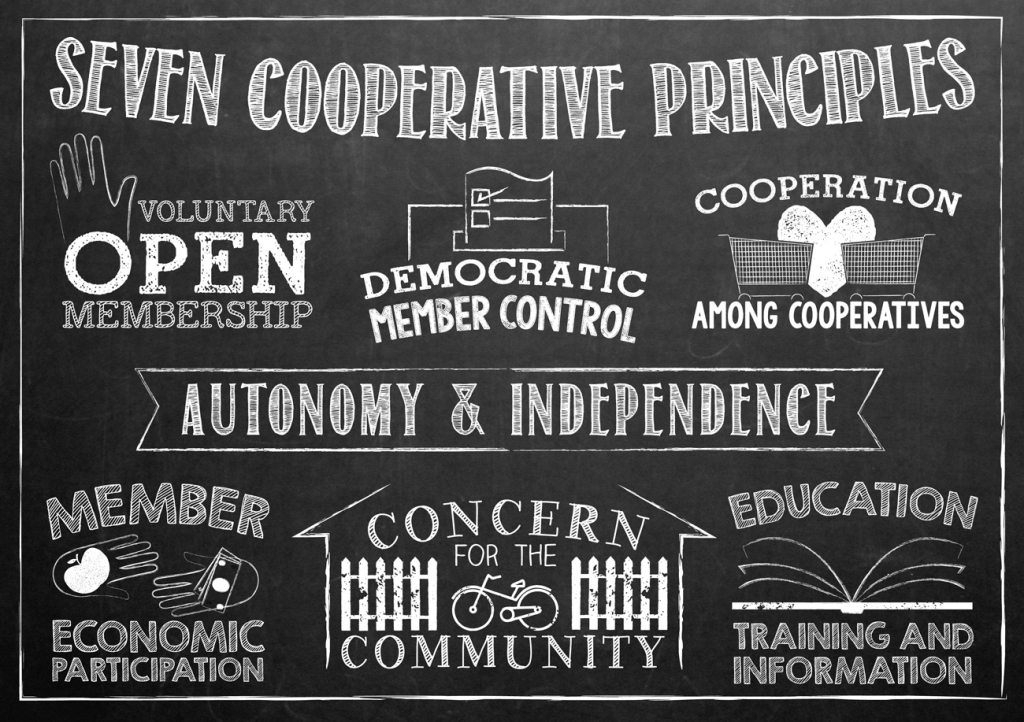
The Seven Cooperative Principles, sourced from the Food Co-op Initiative. You can read more about the OG 7 Cooperative Principles here. You can also watch these short videos on the 7 Principles from Irish and Filipina coop colleagues (The second vid includes some Tagalog).
While all this harkens back to the spirit of commons, the cooperative movement as a whole has not been able to radically reshape economies or extinguish inequality.
Some cooperatives operate as de-facto corporations, act as market players for the collective benefits of their members and, in some cases, demutualize altogether. The animating logic of the commons and the original seven principles [4] are often lost, or relegated in the face of market pressures. In spite of this, we believe that the DisCO framework can help make the cooperative principles more likely to be enacted by strengthening the nourishing bonds between workers and the communities they serve.DisCO adds seven additional principles to the original seven cooperative principles in order to reunite cooperativism with its commons origins and better prepare it for technological futures.
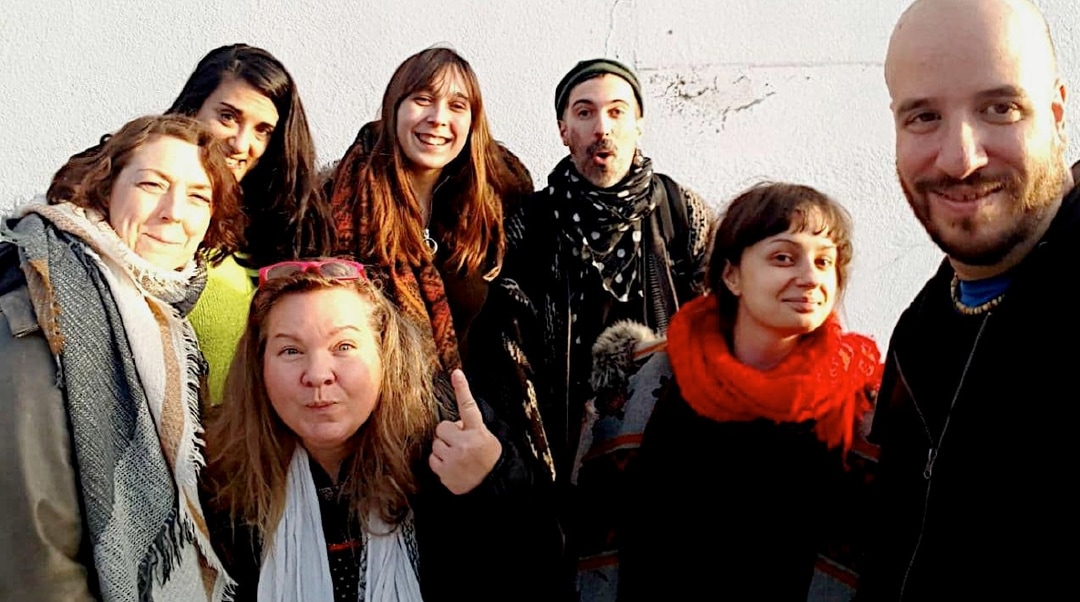
The OG DisCO LAB is Guerrilla Media Collective [5] (or GMC). Created in 2013, GMC is an activist communications collective and agency. The DisCO framework emerged out of GMC’s lived experience, and GMC has served as its testing ground.
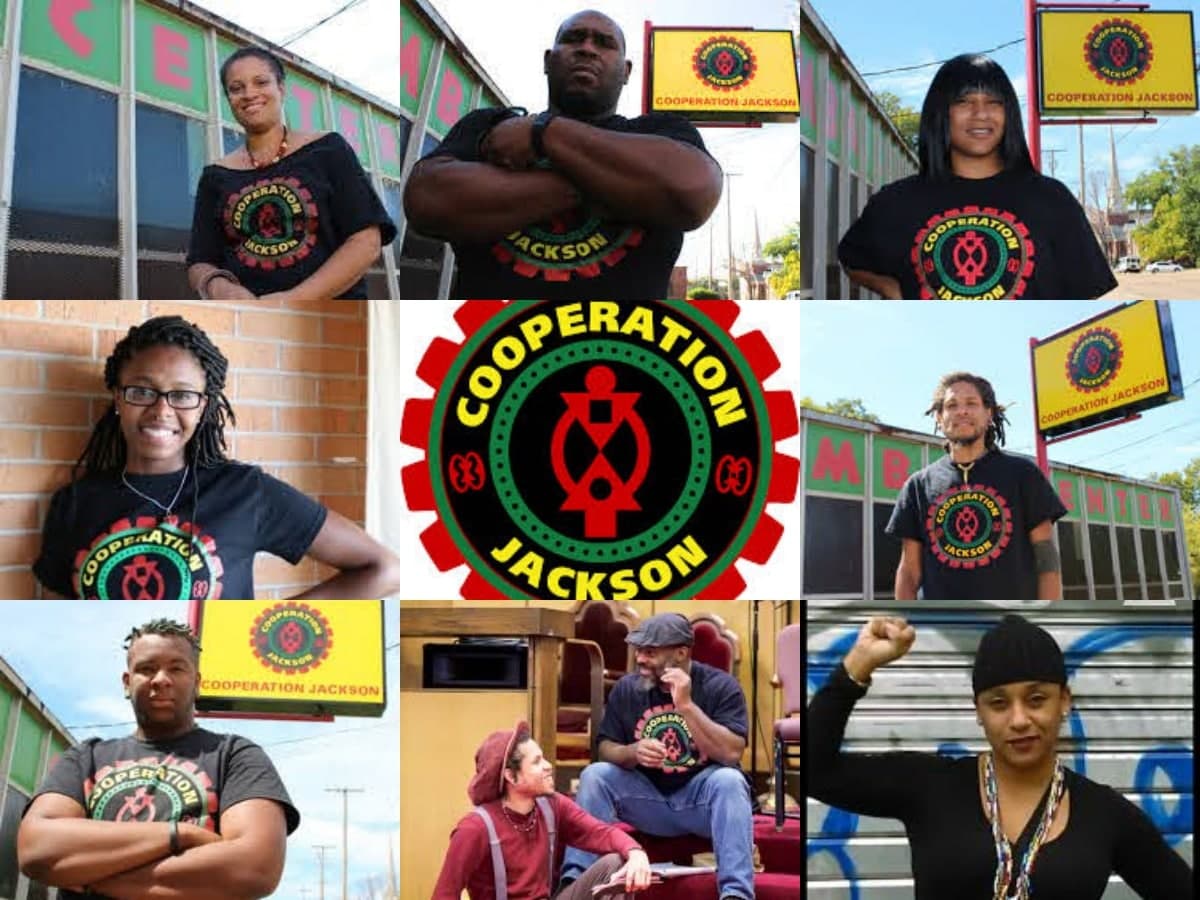
Cooperation Jackson (CJ) is a black solidarity network of cooperatives and worker-owned, democratically self-managed enterprises. Hailing from Jackson Mississippi (USA), CJ has been a substantial inspiration for DisCO and are now in the process of becoming a series of federated DisCO LABS within Jackson. [6]

Multi-Talented Makerspace (MTM) is Zimbabwe’s first makerspace. Following the DisCO Principles and with a deep community orientation, MTM represents a corrective measure for the predominantly white-male-dominated makerspace scene. [7]
As a DisCO LAB, MTM is creating community and making for real-world needs to build new post-capitalist economies in the region.
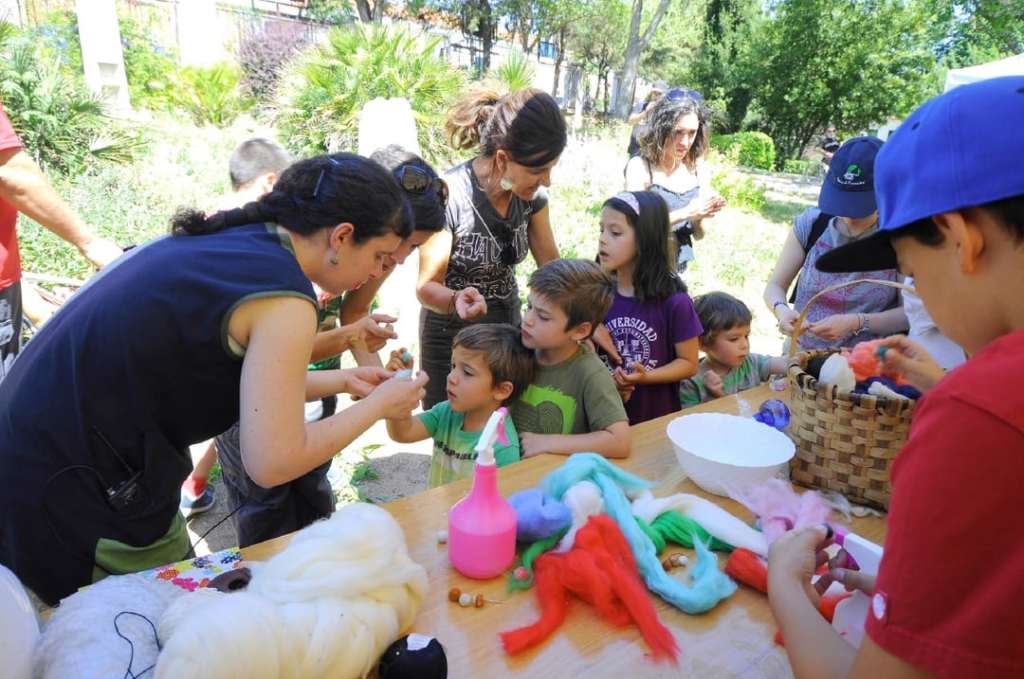
Laneras is a DisCO LAB working with merino wool in the Extremadura region of western Spain. Recuperating ancient wool gathering and weaving practices, Laneras is open-sourcing endangered knowledge and educating commoners on the machinery, tools, and special aspects of truly sustainable fiber and clothing.

DisCO.coop is the organization tasked with carrying out the DisCO Project. The DisCO MOTHERSHIP is the group of humans doing the work and “staying with the trouble”. [8] It includes people from Guerrilla Media Collective and some new team members.
Helping us develop the tech development side is our sister organization Mikorizal Software. In practice, we operate together as an integrated team, dogfooding [9] the DisCO methodology and developing Valueflows [10] in the real world.

The Seven DisCO Principles
Building on the groundwork laid by movements such as Platform and Open Cooperativism, the DisCO LABS follow these principles:
Disco Principle 1: Put your effort where your heart is: values-based accountability

In DisCOs, production is guided not by profit but by social and environmental priorities.
Most companies and indeed many cooperatives, orient their production toward profit and meeting market demands. In DisCOs, production is explicitly guided by need, including social and environmental priorities.
This orientation towards positive outcomes is the heart of a DisCO’s values. The needs-based priorities defined by the cooperative are embedded in each DisCOs legal statutes, as well as the technologies and cultural practices that let DisCOs assess and reflect on the outcomes of their effort.
Guerrilla Media Collective’s Goals and Values inform their practices and are codified in their legal statutes as a non-profit, socially oriented cooperative.
Cooperation Jackson’s principles include self-help, self-responsibility, democracy, equality, equity and solidarity, as well as honesty, openness, social responsibility and caring for others.
Disco Principle 2: Building whole-community governance
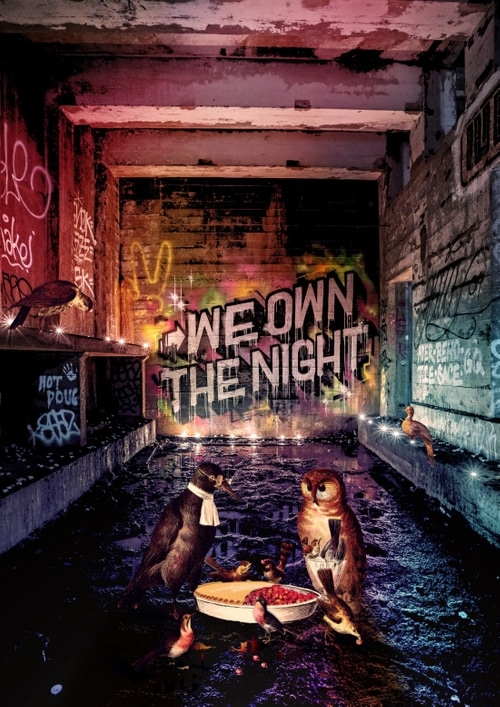
DisCO extends decision making and ownership to all contributors whether present in all value chains or affected by the coop’s actions.
Cooperatives are traditionally geared towards bringing democracy to the workplace. But their economic activity has knock-on effects throughout broader chains of production and consumption. Rather than restricting democratic principles to one organization, DisCOs extend rights of ownership and decision-making powers to all those affected by a DisCO’s activities.
Inspired by the multi-constituent social care co-ops in Quebec, Canada and Emilia Romagna, Italy, DisCOs place measurable value on the distinctive contributions of a defined community that can include workers, neighboring communities, suppliers, clients, those who perform reproductive and affective labor, financial backers, etc.
DisCO.Coop has several layers of membership: Casual members perform pro-bono contributions with no strings attached. Those wanting to become Committed go through a dating phase where they progressively accrue higher levels of decision making power and compensation while learning to build trust within the collective.
Multi-Talented Makerspace is open to everybody (casual relationship). Members can either be active (approved by the board and with voting rights), or supporting (give feedback to the board and receive perks).
Disco Principle 3: Active creators of commons

New digital (code, design, documentation and best practices) and physical (productive and deliberation spaces, machinery) commons are created through various types of work.
Typical market enterprises permit the exploitation of shared wealth, such as land, natural resources or human knowledge. According to mainstream economics, businesses are drivers of a process of enclosure, whereby resources are turned into commodities and relationships into services. DisCOs reverse this trend by actively generating decommodified, open-access resources.
These commons can be digital (e.g., code, design, documentation, legal protocols and best practices) or physical (e.g., productive infrastructure, deliberation spaces, machinery).
Laneras give free workshops on the recuperation of merino wool harvesting traditions in Western Spain. They are also open sourcing low-tech machinery for weaving and looming.
Laneras works to revive sustainable practices, spinning traditions and the use of local raw materials to prevent their loss, and to revitalize the community and territory, protect local land and social bonds and support biological biodiversity and rural development.
Guerrilla Media Collective creates open knowledge repositories of the work they produce, e.g., pro-bono translations and illustrations, shared on the web under a Peer Production License, which benefits coops while discouraging extraction. [11] The collective itself documents its practices in its wiki to share with other DisCOs.
Disco Principle 4: Rebalancing the scale: rethinking global/local economics
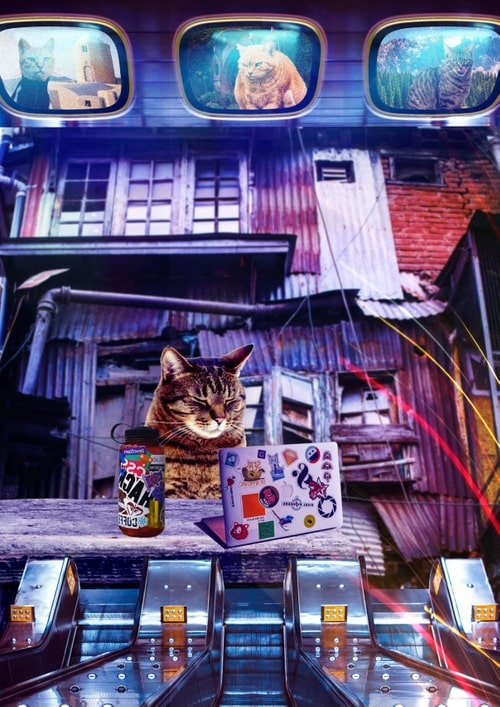
Physical production is kept local while knowledge, resources and values are shared globally with other DisCOs.
Corporations extract resources as if they were infinitely abundant, while restricting immaterial flows of knowledge, usually reproducible at marginal cost, through intellectual property laws and patents. Conversely, DisCOs support and provide a business model for the Design Global, Manufacture Local [12] template.
Here, physical production is kept local and needs-based, while knowledge, resources, and value flows [13] are shared at the global level with like-minded initiatives to create a political and cultural counterpower to the prevailing corporate/capitalist economy. This also requires directing attention toward exclusionary social practices and the willful invisibility of environmental impacts, which are habituated responses carried over from mainstream techno-cultures into peer production communities. DisCOs foster explicit attention to environmental justice and the various forms that enclosure can take, in the so-called new industrial revolution.
DisCO.coop is crewed by the DisCONAUTS. We’re spread among various locations in Spain (Andalusia, Basque Country, Catalonia, Extremadura, Madrid); in Athens, Berlin, London in the EU; in Washington State and rural Wisconsin in the US; and in Mexico City. We all do activist work on the ground, and our work in the DisCO Project is designed to be replicated and developed transnationally. [14]
Multi-Talented Makerspace uses locally sourced materials to produce world standard products. They also work with the Fablab and Makerspace networks worldwide to exchange best practices and learnings, applying them on the ground in Zimbabwe and sharing the knowledge with their immediate community.
Disco Principle 5: Care work is the core

DisCOs are living entities reflecting the values of its members which need care and attention to mantain their health and the well-being of the persons working there.
Care and affective work are essential in DisCOs and are supported through established mutual support structures. These can include a rotating list of designated mentors [15] and support “buddies” [16] in a roster where each person both gives and receives support within the group. In this way we establish a peer-to-peer mentorship, which is horizontal and reciprocal. Emphasis is placed upon openly expressing observations and criticisms about the workings of the group and also sharing individual and collective aspirations, preoccupations, and humor.
This makes space for stronger interpersonal bonds and better trust-based communication, employing healthier and more emancipatory conflict-resolution tools. Beyond individual members, DisCOs extend the notion of care work towards the collective as an entity represented by the upkeep of its goals and values. This empowers individuals to undertake, or at least understand, what would usually be considered bureaucratic or administrative work.
This work is often channeled to either a highly-paid upper management class, or a low-paid assistant function, both acting in the interest of the capitalist class. Upkeep of any DisCO’s social mission is the responsibility of working circles or self-organized teams which collectively manage specific needs (e.g., building community, following leads for livelihood work, evaluating potential co-op members) to ensure that the DisCO is healthy and able to fulfill its values ongoing.
Guerrilla Media Collective is explicitly feminist in its orientation. Members’ emotional well-being is prioritized daily. Work is organized around these needs, not in spite of them. Every member has a dedicated mutual support buddy and the collective is cared for through various circles dedicated to community, sustainability, outside peers and more.
Care work is closely tied to Laneras’ own origins, worldview, and development. Their project has an ecofeminist nature which prioritizes care towards oneself, others, and the environment. Community support networks are essential to their mission and the relationships that members form are strongly grounded in trust, mutual support, and interdependence.
Disco Principle 6: Reimagining the origin and flows of value

Three types of value — market value, commons-creating value, and care work value — are tracked through complementary metrics.
In the capitalist marketplace, production is determined hierarchically and is exclusively oriented toward profit, while value is measured through opaque mechanisms and financial instruments. [17] Further, the value only becomes manifest through market exchange. Everything else is externalized, omitted from the value equation. In DisCOs, production is communal and value measurement aims to be transparent. Three types of value are highlighted and rewarded:
Livelihood Work: productive market value (the DisCO’s goods and services are paid for);
Love Work: productive pro-bono value (the commons created through self-selected volunteer work);
Care Work: reproductive work value (towards the collective and among its members, see above).
All are tracked through complementary value metrics that apply to all DisCO members. Recognizing different types of value influences functions including payments, work priorities, and certain key decisions. This recognition gives visibility and empowerment to other values left out by the market nexus.
Tracking and revealing the often invisible, even dismissed, strands of value-producing labor is structurally different from purely quantifying work. By having the ability to track flows of value produced for both the internal operations and also for external exchanges between clients and the DisCO members, we can hack the neoliberal labor classification, hence value exploitation. Seeing, naming, and tracking the value of Love and Care work lets us reclaim these contributions with the same level of respect afforded to the provision of goods and services.
DisCO.coop organizes its own Valueflows around a Worker Self-directed Non-Profit fork [18] of the DisCO governance model. [19] In this model (DisCO.NP) Livelihood Work is composed of funded/specific project deliverables.
Lovework comprises unfunded DisCO development work, including some partnerships and DisCO LABS. Care Work is the reproductive work needed to keep the machine running and its humans happy. [20]
Cooperation Jackson is working towards fully recognizing care work and repositioning it to reflect the value of worker-cooperatives in building a solidarity economy. This includes caring for marginalised community members, as well as taking special care of those who need more help. Care work in cooperation are at the core.
Disco Principle 7: Primed for federation

DisCOs replicate through a standard federation protocol that allows critical mass without regimenting all parts.
Cooperatives worldwide have a combined turnover of US$3 trillion, which is similar to the aggregate market capitalization of Silicon Valley’s greatest players (Microsoft, Amazon, Google, Apple and Facebook). [21]
Unfortunately, this economic power is dispersed, with many coops only nominally acknowledging the sixth cooperative principle, cooperation among cooperatives.
Unlike networks, which may or may not share common goals, federations are held together by shared commitments, and power is equitably distributed among all nodes. Federations also provide viable alternatives to the dangers of scaling, where a worldview is simply extended from a center of power and forces everything in its path to conform to its values.
DisCOs are distributed and differentiated structures that replicate themselves through a standard federation protocol. [22] This allows federations of DisCOs to achieve critical mass without regimenting all parts.
The modularity of DisCO Value Tracking allows DisCOs to mutualize economic power (as well as shared, non-monetary resources) for greater impact. Every node retains the levels of trust, mutual support and well-being that only small groups can achieve, while still achieving a larger collective impact by being part of broader economic networks.
The long-term goal is to make cooperatives transcend their status as a form of economic alternative and instead, become a collective economic counterpower.
Multi-Talented Makerspace makes sure the ideas, inventions and information that are generated within the DisCO are accessible to anyone who might want to use them. Following an open-source approach, and licensing information and ideas under the universal law of commons, Multi-Talented Makerspace is part of other global and regional networks such as the makerspace movement, the Nook network, connected Sahara, etc.
Cooperation Jackson reinvests most of their surpluses in the Jackson and Kush Districts (the contiguously Afrikan counties of western Mississippi). Surpluses are used to support new jobs and community development (through the use of social funds) and a social security system based on mutual solidarity and responsibility. They also help support cooperation with other institutions, advancing the cause of workers in Mississippi and collaborative efforts towards developing a transformative culture in Mississippi that can be readapted in other cultural contexts.
The 11 Key Values
Complementary to the 7 principles, DisCOs also introduce 11 key values which, taken together, provide the framework to tackle the present challenges posed by the Covid crisis. Based on our experience, DisCOs are:
Balanced in culture and structure: Striking a balance between the off-chain (human) and on-chain (technological) dimensions.
Inclusive, relatable, and educational: Prioritizing accessibility and ongoing self-development and mutual support.
Non-speculative or deterministic: Creating an emergent roadmap, determined by the communities that form the federation and focused on the well-being and socio-environmental priorities.
Multilayered/holonic: Interdependent and transparent value flows. Exchanges are geared toward consensual solidarity, network resilience, and mutual support.
Modular — but not prescriptive: Designing for economic interoperability with complementary frameworks, such as traditional and Platform Coops or the Social Solidarity Economy.
DLT-enabled, but not dependent: Distributed ledger and blockchain tech facilitates human to human interactions, but never pre-determine them.
Online or offline? Onlife! Maximizing trust, holding space for the affective dimension and putting life at the center of our economics in both digital and corporeal spaces.
Copyfair-Licensed: Allowing cooperatives and solidarity-based collectives (but not shareholder-profit-oriented entities) to capitalize on our commons.
Have viable, ethical business models: Creating frameworks for economic counterpower with a strict loyalty to our pro-social guidelines.
Political: Prototyping post-capitalist practice-based alternatives that challenge the patriarchy, colonialism, and the status quo.
Fun or bust! Offering engaging and enjoyable spaces to fulfill a social mission, but never disregarding humor.
What if your community had a way to organize itself to better represent ALL the work that was happening? Not just which is deemed “economic value” but inclusive of commons, care work, and mutual value exchange, within a trusted group of friends? Learn more about the DisCO framework through this webinar presented by Silvia López, from Guerrilla Media Collective and DisCO.coop.
Taken together, the 7 principles and 11 key values provide frameworks to tackle the present challenges exposed by the Covid crisis, identified earlier.
Rather than big state or corporate solutions, social and environmental change is brought to life from below by federated collectives which actively educate in post-capitalist, feminist economics. Volunteer work is no longer ignored or undervalued, rather it is factored into the value equation.
Digital working teams communicate and relate through established working rhythms, [23] where both practical and affective realities are continually discussed. Finally, all production is oriented toward the urgent issues of our time, but without sacrificing well-being or a friendly, enjoyable workplace environment.
These principles and values are articulated through DisCO Governance models (plural), designed to adapt to the cultural and contextual specificities of each DisCO. At the same time, they share common patterns that help fulfill the DisCO principles, as we will explain.
Next on The DisCO Elements:
The next chapter (Take your time, do it right: Commons Governance) will show a guide to how DisCO governance specifically articulates the principles and values outlined in the prior chapter. Includes infographic illustrations about the DisCO Governance and economic model.
About this article
This article is the Third chapter of Groove is in the Heart: The DisCO Elements, which is currently being serialised here on Stacco.works. The featured image is by Felipe Duarte. Click here for full image credits.
DisCO stands for “Distributed Cooperative Organization” and it is a feminist, cooperative and commons-oriented alternative to the mainstream DAOspace. The DisCO Elements is a non-linear introduction to the “hows” of DisCO. Click here to download the full PDF or EPub with extra content or visit DisCO.coop for more resources.
Footnotes
- For a condensed history of the cooperative movement, see this article by CulturalSurvival.org.
- Bollier, David, and Silke Helfrich. Free, Fair, and Alive. Gabriola Island, British Columbia: NEW SOCIETY PUBLISHERS, 2019.
- All these links are sourced from Wikipedia’s page on the Rochdale Principles, we’ve included them here for easy reference while reading the DisCO Elements.
- Furthermore, we have some issues with the naming of the original seven cooperative principles. The current version was revised by ICA (International Cooperative Association) in 1995. We’d love to enter into a respectful dialogue about this naming from a DisCO perspective.
- Guerrilla Media Collective is best known for its commons-oriented translation project Guerilla Translation (GT). Check out GT’s English and Spanish websites, as well as the Guerrilla Media Collective Wiki. All these Elements gave rise to what we know today as DisCO.
- For more on Cooperation Jackson and their history of struggle, download their seminal e-book Jackson Rising: The Struggle for Economic Democracy and Black Self-Determination in Jackson,-Mississippi.
- More and more is being written about the exclusionary practices of maker culture – purporting to be “democratizing” while globally imperializing the concept of local grassroots innovation and aligning it with extractive capitalism. Writers like Sasha Costanza-Chock and Christina Dunbar-Hester redress the dominant narrative of the white male maker by drawing attention to less well known initiatives and makerspaces in their publications.
- You can find a regularly updated spec-doc for the DisCO Project here.
- From Wikipedia: “Eating your own dog food or dogfooding is the practice of an organization using its own product. This can be a way for an organization to test its products in real-world usage. Hence dogfooding can act as quality control, and eventually a kind of testimonial advertising. Once in the market, dogfooding demonstrates confidence in the developers’ own products.” In DisCO. coop’s case it’s not so much a product as a living commons.
- Valueflows is a set of common vocabularies to describe flows of economic resources of all kinds within distributed economic ecosystems. DisCO is one specific instance of Valueflows with plenty of wiggle room for situation-specific, feminist and commonsoriented adaptations. Valueflows is, however, not limited to DisCOs and works with other models and “Next Economy” frameworks.
- From the DisCO Manifesto: “The Peer Production License allows cooperatives and solidarity-based collectives, but not corporations, to monetize productive works. Similar to how the Fairshares Association facilitates the capitalization of assets within their networks, DisCOs can use PPL to allow purpose-oriented organizations to become more economically resilient by creating and controlling their own shared assets in a permissionless manner.”
- For a layperson’s overview, see our article Reimagine, Don’t Seize the Means of Production.
- As mentioned above, Valueflows is the economic vocabulary informing DisCO interactions. For more information, visit Valueflo.ws
- During the writing of the DisCO Elements DisCO.coop was organized around two legal structures. A 501 non-profit in the US and the new DisCO Foundation. The latter was in progress, so the EU side of the project was legally hosted by Guerrilla Media Collective, which is a worker-owned, noprofit, socially oriented coop under Spanish law. Since the original publication DisCO has established it’s own worker-owned, noprofit, socially oriented coop
- See our entry on Mentoring for more.
- See our entry on Mutual Support
- Pazaitis, Alex, Primavera De Filippi, and Vasilis Kostakis. “Blockchain and Value Systems in the Sharing Economy: The Illustrative Case of Backfeed.” Technological Forecasting and Social Change. Science Direct, June 10, 2017.
- Watch this page for updates in the DisCO MOTHERSHIP Governance Model.
- Unlike DisCOs based on worker-owned coop legal structures (where the governance/value model is applied to the income generated by selling goods and services) DisCO.coop is in essence a non-profit, with capital coming in through philanthropic, institutional or crypto grants, not goods and services.
- Jump to the chapter on Care Work for more info.
- Until recently (2018) these were similar numbers. At the time of writing MAGAF has leapt to US$4.9 trillion. Source for cooperative stats: Measuring the size and scope of the cooperative economy: Results of the 2014 global census on co-operatives. Dave Grace & Associates, October 9, 2014.
- See our section on the Federation Protocol.
- See our entry on Community Rhythms.